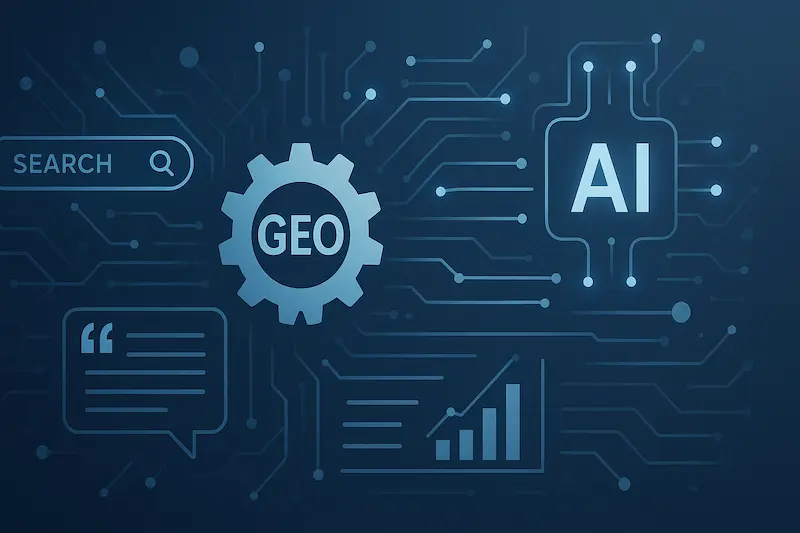Why Your Website Needs GEO Optimization (And It's Not About Geography)
Discover how Generative Engine Optimization (GEO) can boost your website visibility by 40% in AI search results. Learn the strategies that actually work in 2025.

Remember when getting to the top of Google search results felt like winning the lottery? Well, plot twist: there's a new sheriff in town, and it goes by the name of Generative Engine Optimization (GEO).
If you've been scratching your head wondering why your perfectly optimized content isn't getting the traffic it used to, you're not alone. The game has changed, and it's time we talk about it.
What Exactly Is GEO?
Think of GEO as SEO's tech-savvy cousin who went to MIT. While traditional SEO focuses on ranking in search results, GEO is all about getting your content featured in AI-generated responses from platforms like ChatGPT, Perplexity, and Google's AI Overviews.
Here's the kicker: 58% of users have already started replacing traditional search engines with AI tools for finding products and services. That's not a future trend—that's happening right now.
The Numbers That'll Make You Pay Attention
A groundbreaking study from Princeton University found some eye-opening results:
- 40% increase in visibility for websites using proper GEO techniques
- 115% improvement for smaller websites (yes, you read that right)
- 63% of websites are already seeing traffic from AI search engines
The most surprising finding? Lower-ranked websites actually benefit MORE from GEO than the big players who dominate traditional search. Finally, a level playing field!
The Three Magic Ingredients That Actually Work
After analyzing thousands of queries, researchers identified the top three strategies that consistently boost AI visibility:
1. Add Real Citations (Not Just Links)
AI loves content that references credible sources. Instead of just saying "studies show," try "According to a 2024 study by Stanford University..." with proper attribution. It's like giving AI systems the confidence boost they need to trust your content.
2. Include Expert Quotes
This one surprised everyone—adding quotes from industry experts increased visibility by 41%. Even customer testimonials count. AI seems to understand that multiple voices make content more trustworthy.
3. Back Everything Up with Statistics
Replace wishy-washy statements with hard numbers. Instead of "many businesses struggle with..." try "67% of small businesses report challenges with..." AI eats up concrete data like it's digital candy.
Why This Matters More Than You Think
Here's what's really happening behind the scenes: when someone asks ChatGPT "What's the best project management tool for small teams?", the AI doesn't just randomly pick answers. It synthesizes information from sources it deems most credible and comprehensive.
If your content isn't optimized for this new reality, you're essentially invisible to a rapidly growing segment of searchers. Gartner predicts that 25% of search volume will shift to generative engines by 2028.
Getting Started Without Losing Your Mind
The good news? You don't need to throw out your entire content strategy. GEO works alongside traditional SEO, not against it. Here's your starter checklist:
- Audit your best content - Pick your top 10 performing pages
- Add 3-5 credible citations to each piece
- Include at least one expert quote or customer testimonial
- Replace qualitative statements with specific statistics where possible
- Structure content with clear headings - AI loves well-organized information
The Tools That Don't Break the Bank
You don't need enterprise-level tools to get started. HubSpot's AI Search Grader offers a free way to check how AI-friendly your content is. For more advanced tracking, platforms like ChatRank help monitor how often your brand appears in AI responses.
What Not to Do (Learn from Others' Mistakes)
The research revealed some strategies that actually hurt your chances:
- Keyword stuffing - Decreased visibility by 10%
- Overly promotional language - AI systems avoid content that sounds too sales-y
- Generic, fluffy content - Specificity wins every time
The Bottom Line
GEO isn't about replacing everything you know about content optimization. It's about evolving with how people actually search for information today. The brands that adapt early are already seeing the benefits, while others are wondering where their traffic went.
The beautiful thing about GEO? It rewards the same qualities that make content genuinely helpful: credibility, expertise, and usefulness. So while you're optimizing for AI, you're also creating better content for humans.
Start small, test what works for your industry, and remember—even AI appreciates content that doesn't sound like it was written by a robot trying to impress other robots.
After all, in a world where artificial intelligence is getting smarter every day, maybe the most revolutionary thing we can do is be more human in our approach to content. How's that for irony?
Ready to future-proof your content strategy? Start implementing these GEO techniques today, and don't forget to measure what matters. The future of search is already here—might as well get comfortable with it.
References:
1. Princeton University GEO Research Study
2. Gartner Technology Research
3. HubSpot AI Search Tools
4. ChatRank AI Monitoring Platform
5. Ahrefs SEO and AI Research